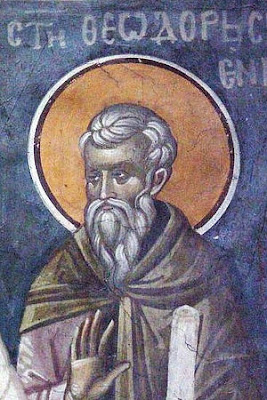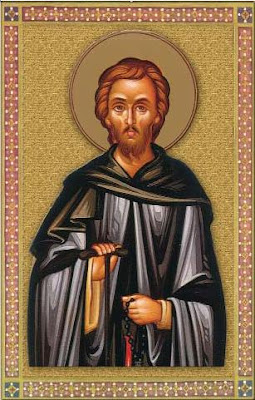 |
| St. Theodore the Sanctified (Feast Day - May 16) |
Verses
You are shown to be a divine gift Theodore,
Among the Saints O sanctified Saint.
On the sixteenth Theodore flew away from the earth.
Among the Saints O sanctified Saint.
On the sixteenth Theodore flew away from the earth.
Saint Theodore was called “Sanctified” because he had purified his heart of its passions and made his body a worthy temple of the Holy Spirit, so that he was the first in his monastery to be ordained to the priesthood.*
Saint Theodore came from Egypt and was the son of wealthy and noble Christian parents. The yearning for monastic life appeared early in him. Once there was a large party at the house of his parents during the feast of Theophany. The boy did not want to take part in the festivities, grieving that because of earthly joys he might be deprived of joys in the life to come. He secretly left home when he was fourteen and entered one of the monasteries in the diocese of Sne, near the modern town of Esna, Egypt. A brother from Theodores’ monastery stayed with Abba Pachomios in Tabennisi while traveling and preached of the virtues of the cenobium upon his return to Sne.
Hearing about Pachomios the Great, he burned with the desire to see the ascetic. Although initially denied passage to Tabennese by a Pachomian monk due to his wealthy background, Theodore opted to follow the visiting monk, and his persistence (and lack of obedience) paid off. He was welcomed by Pachomios upon his arrival, having been informed by God beforehand about his coming, and quickly integrated into the community at Tabennisi around 328. Remaining at the monastery, Saint Theodore quickly succeeded in all his monastic tasks, particularly in his complete obedience to his spiritual father, and in his compassion towards the other brethren. Theodore’s mother, learning that he was at the Tabennisi monastery, came to Saint Pachomios with a letter from the bishop, asking to see her son. Saint Theodore did not wish to break his vow to renounce the world, so he refused to meet with his mother. Seeing a convent not far away which was under the spiritual direction of Pachomios' sister, she entered the convent and was tonsured a nun. After a period of time Paphnutios, Theodore's brother, also came to the monastery and was tonsured a monk.
Seeing Theodore’s strength of mind and ability, Pachomios once told him to instruct the brethren on Holy Scripture. Saint Theodore was then only twenty years old. He obeyed and began to speak, but some of the older brethren took offense that a new monk should teach them, and they departed. Pachomios said to them, “You have given in to the devil and because of your conceit, your efforts will come to naught. You have not rejected Theodore, but rather the word of God, and have deprived yourselves of the Holy Spirit.”
Pachomius appointed Saint Theodore as overseer of the Tabennisi monastery, and withdrew to the more solitary Monastery of Phbow (several new monasteries had been built by this time). However, Pachomios recalled him from the position after witnessing several monks under Theodores’ watch violating the monastic rules without reprimand. Having failed to prove his governing ability and once more in a position no higher than when he had entered the monastery, Theodore became a personal assistant to Pachomios and remained relatively quiet for some years. Despite his clear potential and popularity, Pachomios refused to grant Theodore any kind of authority; though the old man's failing health soon changed things forever.
When Theodore the Sanctified was in Panopolis with Saint Pachomios, his spiritual father, a philosopher came to him and offered to debate with him about the Christian faith. The philosopher then posed these three questions to Theodore: "Who was not born, but died?" "Who was born and did not die?" "Who died and did not decay?" To these questions, Theodore replied: "Adam was not born and died. Enoch was born and did not die. Lot's wife died and did not decay." And the Saint added this advice to the philosopher: "Heed our sound advice; depart from these useless questions and scholastic syllogisms; draw near to Christ Whom we are serving and you will receive forgiveness of sins."
After Theodore had been assisting Pachomios at Tabennisi for several years following his demotion, Pachomios became very ill and seemed to be on the verge of death. Pachomios had not named a successor, and several brothers pleaded with Theodore to assert himself as head of the cenobium when the sickly man died. Despite the assertion that Theodore apparently did not want the rank of a father, he consented. Unfortunately for the would-be leader, Pachomios recovered, and upon hearing of Theodore’ decision, exiled the ambitious young man. After living a life of constant weeping and prayer in solitude, Pachomios forgave Theodore and allowed him to live among the brothers once more. Normalcy returned, though never again would Pachomios fully trust his former protégé.
In 348 Saint Pachomios died, naming the monk Petronios as his successor rather than the clearly qualified Theodore. The death of Petronios later that year would leave Apa Horsiesios (Orsisius) in charge, and the popular Theodore would retreat to the distant Monastery of Phnoum. Although it seems Theodore practiced complete submission to the new leader of the cenobium, problems soon arose in several Pachomian monasteries that viewed Horsiesios as a weak leader. Refusing to work or communicate and demanding a new leader, many of the elder monks completely abandoned any notion of obedience to Horsiesios. The federation of monasteries was falling apart, and Theodore rushed to Tabennisi to placate the rebels. Soon after his arrival, Theodore was the new de facto leader, though he claimed to be only acting on behalf of Horsiesios. For eighteen years Theodore administered from Pachomios’ old headquarters in Phbow, using techniques far more assertive than his predecessors, such as constantly shuffling the offices and locations of the most ambitious monks. Yet in spite of this somewhat unstable shifting, he oversaw the Thebaid monasteries peacefully for nearly two decades, at which point Theodore predicted he would soon die. Within a few months his prediction came true, and Apa Horsiesios once more took his place as the head of the communities in both title and authority.
Saint Theodore the Sanctified was famed for his sanctity of life, and the great gifts of wonderworking and prophecy (many of his miracles and prophecies are recorded in the Letter of Ammon), and he was well known to Saint Athanasius, Patriarch of Alexandria, who heaped praises on Theodore after his passing. Saint Theodore reposed in his old age in the year 368.
Notes:
* Typically abbots of monasteries in the early centuries of monasticism were not ordained to the priesthood, unless previously ordained. Instead, a monk of the monastery was chosen for ordination to serve the liturgical needs of the community. It became more common in the sixth century for the abbot to be ordained, initially as a deacon then as the practice became more common as an archimandrite.
Letters 57 and 58 of St. Athanasius of Alexandria to St. Orsisius of Tabennisi
Letter 57.
First Letter to Orsisius.
I have seen your fellow-worker and father of the brethren, Theodore, and in him the master of our father Pachomios. And I rejoiced to see the sons of the Church, and they made me glad by their presence. But the Lord is their recompenser. And as Theodore was about to leave me for you, he said to me: "Remember me." And I said to him: "If I forget thee, O Jerusalem, let my right hand be forgotten, yea let my tongue cleave to my throat if I remember thee not" [Ps. 137:6, LXX.].
Letter 58.
Second Letter to Orsisius.
Athanasius to Orsisius, Abbot, father of monks, and to all with him who practice the solitary life, and are settled in faith in God, beloved brethren most longed for in the Lord, greetings.
I have heard about the decease of the blessed Theodore, and the tidings caused me great anxiety, knowing as I did his value to you. Now if it had not been Theodore, I should have used many words to you, with tears, considering what follows after death. But since it is Theodore whom you and I have known, what need I say in my letter save "Blessed is Theodore, who hath not walked in the council of the ungodly" [cf. Ps. 1:1.]?
But if "he is blessed that feareth the Lord" [Ps.112:1], we may now confidently call him blessed, having the firm assurance that he has reached as it were a haven, and has a life without care. Would that the same had also befallen each one of us; would that each of us in his running might thus arrive; would that each of us, on his voyage, might moor his own bark there in the stormless haven, so that, at rest with the fathers, he might say, "here will I dwell, for I have a delight therein" [Ps. 132:14].
Wherefore, brethren beloved and most longed-for, weep not for Theodore, for he "is not dead, but sleepeth" [Matt. 9:24]. Let none weep when he remembers him, but imitate his life. For one must not grieve over one that is gone to the place where grief is not. This I write to you all in common; but especially to you, beloved and most longed for Orsisius, in order that now that he is fallen asleep, you may take up the whole charge, and take his place among the brethren. For while he survived, you two were as one, and when one was away, the work of both was carried on: and when both were there you were as one, discoursing to the beloved ones what made for their good. Thus act, then, and so doing write and tell me of the safety of yourself and of the brotherhood. And I exhort you all to pray together that the Lord may grant further peace to the Churches. For we now kept festival with joy, both Easter and Pentecost, and we rejoice in the benefits of the Lord. I write to you all. Greet all who fear the Lord. Those with me greet you. I pray that you may be well in the Lord, beloved and much-longed-for brethren.
Apolytikion in the First Tone
Dweller of the desert and angel in the body, you were shown to be a wonderworker, our God-bearing Father Theodore. You received heavenly gifts through fasting, vigil, and prayer: healing the sick and the souls of those drawn to you by faith. Glory to Him who gave you strength, glory to Him who crowned you, glory to Him who through you grants healing to all.
Another Apolytikion in the Third Tone
Thou wast a sanctified gift and didst glorify God the Word, O holy, godly Theodore. Filled with divine goodness, thou pourest grace on all who cry:/ Pray to Christ our God to grant us His great mercy.
Kontakion in the Second Tone
Thou didst flourish like a date palm in the house of God, and produce fruits of virtue by thine asceticism, O Theodore. Therefore thou art now blessed, and art rejoicing with the Angels.

